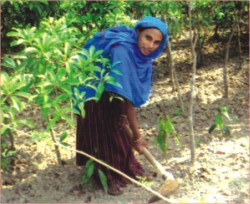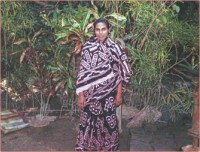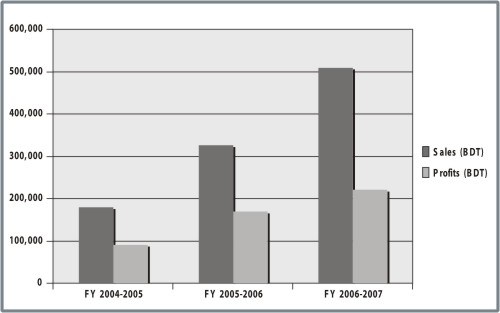| From Shatkhira
Colours that Emerge From Green
Zahidul Naim Zakaria

Although colours of the spectrum emerge from whi te, the culmination of all shades, in nature colours emerge from green. It is the green chlorophyll of leaves that feed all other colours, sustaining the purple shade of lychees and the yellow-vermillion shade of mangoes. And with the green covering of the earth becoming less dense with each passing day, prophecies of global disasters to cause the discontinuation of our species are becoming more and more real. Thanks to the media and awareness building campaigns, the society is now well informed about the ill-effects of global warming and its influence in volatilising weather patterns that has increased the frequency of natural calamities. But, alas, people have become so used to their energy-hungry lifestyle that there seems to be very little hope for any significant improvement in the future. The world's 'green' drive, from green energy-efficient technologies to Obama's 'green-collar' jobs, have yet to make their mark in counteracting the effect of the world's effluent wastes. te, the culmination of all shades, in nature colours emerge from green. It is the green chlorophyll of leaves that feed all other colours, sustaining the purple shade of lychees and the yellow-vermillion shade of mangoes. And with the green covering of the earth becoming less dense with each passing day, prophecies of global disasters to cause the discontinuation of our species are becoming more and more real. Thanks to the media and awareness building campaigns, the society is now well informed about the ill-effects of global warming and its influence in volatilising weather patterns that has increased the frequency of natural calamities. But, alas, people have become so used to their energy-hungry lifestyle that there seems to be very little hope for any significant improvement in the future. The world's 'green' drive, from green energy-efficient technologies to Obama's 'green-collar' jobs, have yet to make their mark in counteracting the effect of the world's effluent wastes.
In the wake of such crises, the need for environment-friendly professions that can protect the earth has intensified. Such professions include tertiary level, high-tech professions such as developing alternative fuels and at the same time, include primary level work such as the plantation of trees, flowers and greenery in general, all of which can at least attempt to detoxify the unacceptably high carbon, lead and sulphur content present in the metropolitan air we breathe today. An example of such a 'green' professional is Munni Begum, who owns a nursery in a village called Terulia, located in Kaliganj upazilla of Shatkhira district.
Munni Begum's Rotna nursery is a testament to the contribution of microfinance programmes to the development of rural Bangladesh, and a beacon of hope for many similar micro-investments. “Although microfinance programmes address a significant constraint the lack of access to credit, it alone cannot enable a rural investor to become successful”, says Munni Begum. According to her, there are many instances of businesses suffering losses or being closed down altogether simply because of the lack of capacity. Firstly, rural investors rarely understand how to evaluate different business prospects since they have had no training in how to decide on the most profitable path of investment. There are many who fail simply trying to copy other businesses, or fail trying to set up businesses based on rumours and advice from uninformed individuals.
 Munni Begum first started with a small livestock farm in 1997 with a microfinance loan of only Tk. 2500 from Ahsania Mission. In subsequent years, she was advised by the same organisation to think about building a nursery. After receiving a loan totalling Tk. 22,500, in four parts over four years (1997-2000), and being trained extensively by both her funding organisation and the local Department of Forestry, she set up “Rotna Nursery” in the year 2000 at a 1 bigha leased piece of land next to her home. She has re-invested most of her profits each passing year in her business, and the project has grown consistently and impressively over the last few years. Her nursery, which sells all sorts of locally grown flowering plants, currently boasts a total area of 10 bighas (3.5 bigha of which is owned by Munni Begum), and average annual net profits equal to Tk. 120,000 over the three fiscal years from 2004 to 2007 a value which has grown from Tk. 90,000 in FY 2004-2005 to Tk. 220,000 in FY 2006-2007 a yearly growth rate of 72 per cent! Munni Begum first started with a small livestock farm in 1997 with a microfinance loan of only Tk. 2500 from Ahsania Mission. In subsequent years, she was advised by the same organisation to think about building a nursery. After receiving a loan totalling Tk. 22,500, in four parts over four years (1997-2000), and being trained extensively by both her funding organisation and the local Department of Forestry, she set up “Rotna Nursery” in the year 2000 at a 1 bigha leased piece of land next to her home. She has re-invested most of her profits each passing year in her business, and the project has grown consistently and impressively over the last few years. Her nursery, which sells all sorts of locally grown flowering plants, currently boasts a total area of 10 bighas (3.5 bigha of which is owned by Munni Begum), and average annual net profits equal to Tk. 120,000 over the three fiscal years from 2004 to 2007 a value which has grown from Tk. 90,000 in FY 2004-2005 to Tk. 220,000 in FY 2006-2007 a yearly growth rate of 72 per cent!
Munni Begum is revered as a successful businesswoman in her area now, and needless to say, she serves as a torch-bearer of women's empowerment and entrepreneurship of Bangladesh. Other than making a living for herself and her family, she has created employment opportunities of 8 additional workers, 4 of which work part-time and 4 of which work full-time at her nursery. It's obvious that she overcame many social barriers on top of business constraints to come this far, she is one of the those who have been able to transform the traditional roles that society gives on to on women in Bangladesh, especially in the rural scene. When she expressed her wish to attend training programmes in the beginning, she faced a lot of resistance from elders, especially from her in-laws. But now, after 8 years of success, instead of looking at her judgmentally, people come to her for advice and to seek the wisdom she has gained from experience.
 |
| Figure: Rotna Nursery's yearly sales and profits
over the last three fiscal years |
When she is asked about what has enabled her to come this far, she says that she has always tried to be disciplined in her work, a trait she has tried to develop in her employees as well. Stating how grateful she is to her husband, who helped in dealing with her in-laws when they tried to restrict her growth as an entrepreneur, she reckons that due to the male-dominance in our society, it's extremely difficult for a woman to start and run her own business without the support of her husband. Her husband has also helped her to distribute her products, make contacts and develop business outside the village. She is also very grateful to the field employees of the organisation that funded her initiative, who came to her home and talked to her in-laws and family members on many occasions. These employees have held her hand all throughout the journey, they have consulted her in her endeavours, stood by her when she needed administrative help in order to lease land, trained her on how to process and grow flowers and seeds for flowering plants, helped her with sales promotion activities and distribution, and last but not the least, provided her the first source of finance which she needed to start her business. Munni Begum has helped her family and relatives with her earnings, and has spent Tk. 30,000 to send her brother to Saudi Arabia.
Copyright
(R) thedailystar.net 2009
|
|
